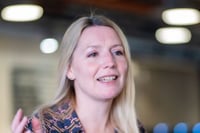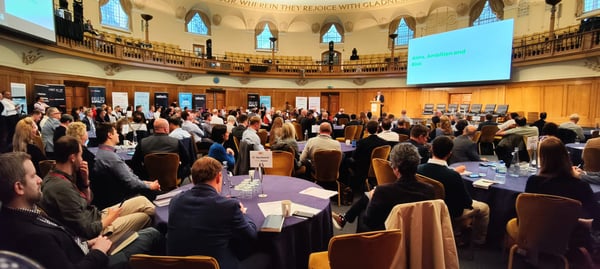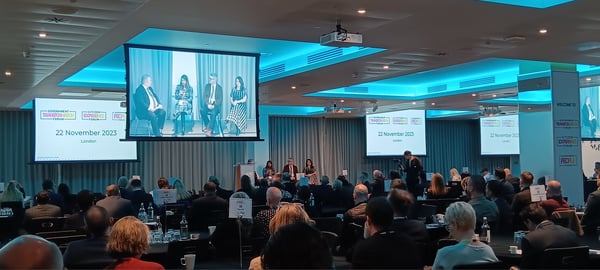A year in quotes: ‘The potential we have here is immense’
As Civil Servants and public sector professionals prepare to take a well-earned break this festive period, it is an apt time to take a look back at 2023.
This collection of thought-provoking quotes from conversations with DDaT leaders offers a glimpse into the priorities and challenges that shaped the last twelve months. Seamless user journeys, cross-government working, the adoption of AI, data interoperability and building digital capabilities emerged as major discussion points.
Despite the pressures and challenges, there is much optimism found amongst public service digital leader...read for yourself!
"The potential we have here is immense. We finally have a service that removes friction from the way data is provided and accessed across government, enabling a simple flow of analysis into policy evaluation and development – putting us on the front foot to solve pressing challenges.”%20Government%20Digital%20Service-0019%20copy%20(2)-1.jpg?width=200&height=192&name=Primary%20choice%20-%20Alison%20Pritchard%20Director%20General%20(Interim)%20Government%20Digital%20Service-0019%20copy%20(2)-1.jpg)
In an interview with Alison Pritchard, she puts context behind the launch of the Integrated Data Service. In doing so, she highlights the potential for linked data to provide otherwise untapped insights that can shape policy and enhance public services – a hint at what the future of government decision-making could look like.
 “This will be one of the biggest learning moments for the Civil Service ever.”
“This will be one of the biggest learning moments for the Civil Service ever.”
In September, ‘One Big Thing’ launched, giving more than 500,000 Civil Servants the opportunity to develop skills and confidence in using data. Jo Farrar, Chief Executive of NHS Blood and Transplant and Senior Responsible Owner for One Big Thing, reflected on the significance of this initiative.
 “Technology is moving at a pace where unless we work together, we won’t be able to operate.”
“Technology is moving at a pace where unless we work together, we won’t be able to operate.”
Instead of looking at what the public sector can learn from the private sector – and vice versa – Rich Corbridge, Chief Digital & Information Officer at DWP Digital, argued that the focus needs to be on working together. He identified this as a key trend that will shape the future of government delivery.
“I want to blur the line between the public, government and the Civil Service. It’s  about having a lot of conversations with a lot of people, empowering technical experts and unheard minorities. We want to collaborate, not command.”
about having a lot of conversations with a lot of people, empowering technical experts and unheard minorities. We want to collaborate, not command.”
Earlier this year, the Scottish Government’s Chief Data Officer, Tom Wilkinson, described his vision for data to be harnessed to create a more seamless service for the people of Scotland by building data systems aimed at creating new networks to share knowledge.
“Defining fairness and measuring algorithmic fairness is quite hard, regulators and other organisations have questions about how best to approach this.”
other organisations have questions about how best to approach this.”
Transparency over algorithms will become essential to build the trust in AI models and ensure ethical safeguards are upheld, explained Felicity Burch, Executive Director at the Centre for Data Ethics and Innovation.
“There are colleagues who still believe digital refers to ‘the IT-Crowd people’ in the corner.”
 The digital workforce is growing rapidly in government. However, this quote taken from a conversation with Thomas Beautyman, Deputy Director Government Digital Capability at the Cabinet Office, acknowledges that there is still work to be done to ensure people right at the top of government organisations understand the importance of investing in digital capabilities.
The digital workforce is growing rapidly in government. However, this quote taken from a conversation with Thomas Beautyman, Deputy Director Government Digital Capability at the Cabinet Office, acknowledges that there is still work to be done to ensure people right at the top of government organisations understand the importance of investing in digital capabilities.
“Life goes on.”

In an interview with Oleg Polovynko, Chief Information Officer at Kyiv City Council, he spoke about the inspiring journey his team has been on to bring safety and normalcy back to the city and its inhabitants a year on from the Russian invasion of Ukraine. From transforming a bus app into a missile warning function, to creating a digital twin to reconstruct the city, their story is a lesson in digital resilience during an unspeakably challenging time.
 “Move fast, break things. This is a mantra I repeat to my team whenever we are engaging in a new challenge or idea.”
“Move fast, break things. This is a mantra I repeat to my team whenever we are engaging in a new challenge or idea.”
John Kelly, Chief Data Officer at the HM Treasury, reflected on the need for today’s digital leaders to challenge entrenched behaviours and mindsets by cultivating an innovative culture.
“Too often, we're starting with tech and too often we are bending that tech to work in the same way.”
Taking to the stage at the Government Transformation Summit in November, Joanna Rowland, Director General, Transformation at HMRC, argued that transformative results may only be possible if government agencies can break free from traditional ways of doing business and explore new models of service delivery.
“It’s a wickedly complicated problem. There’s no real practical guide showing how to make even a 1% gain.”
 Natalie Jones, Director of the GOV.UK One Login Programme at Government Digital Services (GDS), reflected on her journey to create a more sustainable GDS. In doing so, she highlights one of the biggest obstacles to decarbonising digital services.
Natalie Jones, Director of the GOV.UK One Login Programme at Government Digital Services (GDS), reflected on her journey to create a more sustainable GDS. In doing so, she highlights one of the biggest obstacles to decarbonising digital services.
“Instead of siloing customers, we're trying to open up and give them an opportunity to come in through multiple channels.”
to come in through multiple channels.”
As part our data interoperability deep dive, Jacqui Leggetter, Head of Data Integration at DWP Digital, described how she and her team are striving to provide a more agile and seamless user experience founded around the re-use and sharing of data.
“We need to buy-in to the greater good for society’s benefit around data: what is it and why is it needed? Only then can it genuinely begin to feed into  decision-making and produce new analysis.”
decision-making and produce new analysis.”
Fiona James, Chief Data Officer at the Office for National Statistics, emphasised the potential of data for public good. This depends on whether organisations understand the true benefits of data; can it ever been seen as more than something that needs to be protected, she asks.
“We are using AI to build the foundations of a more personalised service provision.”
Earlier this year, Ott Velsberg, Estonia’s Chief Data Officer, described how his team are using chatbots to create "effortless communication" between government and its citizens; part of Estonia’s vision to become AI-powered by 2030.
“You can't run digital transformations without data transformations and you can't  evaluate government policies without being able to have interoperable data across systems; this is important in understanding not just what's happening, but also what's working.”
evaluate government policies without being able to have interoperable data across systems; this is important in understanding not just what's happening, but also what's working.”
Neil McIvor, Chief Data Officer at the Department for Education, made a compelling case for big data to provide even bigger outcomes when discussing his School Attendance Project at the start of the year - an important lesson in cross-sectoral data sharing.
“Data is an art and a science; it is not just a technical exercise, it is an exercise in culture.”
exercise in culture.”
Ima Okonny, Chief Data Officer at Employment and Social Development Canada, described the critical role of culture change in delivering her data strategy across the organisation; an ongoing challenge given there are 40,000 employees spanning the entire country.
 “It is quite often the simplest things that have the biggest impact."
“It is quite often the simplest things that have the biggest impact."
Stephanie Howarth, the Welsh Government’s Chief Statistician, broke down her approach to using data to create more efficient and effective public services by making it as accessible and easy to use as possible.





